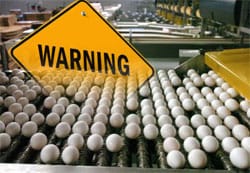
An egg farm linked to a deadly outbreak of Salmonella in 2010 had been warned about dangers of sick hens months before the massive outbreak. Salmonella is a dangerous, sometimes deadly, food borne infection. A scientist at Iowa State University (ISU) discovered evidence that the sick hens, at farms owned by an egg producer in […]
 An egg farm linked to a deadly outbreak of Salmonella in 2010 had been warned about dangers of sick hens months before the massive outbreak. Salmonella is a dangerous, sometimes deadly, food borne infection.
An egg farm linked to a deadly outbreak of Salmonella in 2010 had been warned about dangers of sick hens months before the massive outbreak. Salmonella is a dangerous, sometimes deadly, food borne infection.
A scientist at Iowa State University (ISU) discovered evidence that the sick hens, at farms owned by an egg producer in Iowa, were “almost certainly” laying eggs that were tainted with the Salmonella pathogen, said The Associated Press (AP).
ISU’s Veterinary Diagnostics Laboratory discovered Salmonella in manure at a number of Iowa egg-laying plants as well as in the birds’ organs, which were dying at unusually high rates, said the AP. The illnesses came to light some four months before the August 2010 recall of 550 million eggs, records show.
The laboratory reported the results to the producer, who requested the testing; however, according to the scientists involved, the lab was under no legal or ethical obligation to advise regulators or consumers, said the AP. As a matter-of-fact, the tests were only just made public as part of a civil lawsuit. In the meantime, a federal grand jury is reviewing if executives at the egg company misled consumer by marketing their eggs as safe while knowing they were contaminated. Not unexpectedly, attorneys for some of the executives deny their clients were involved in any criminal activity in the outbreak that sickened at least 62,000 people, according to the U.S. Food & Drug Administration (FDA), said the AP.
Rodger Main, lab operations director, said the Salmonella enteritidis strain discovered and linked to the massive outbreak, does not have to be reported to the government and that the lab would have violated confidentiality agreements it signs with food producers—who pay for the voluntary testing—had they released that information, said the AP. “Our role is to provide a third-party quality assured diagnostic service, and it’s up to the client to interpret the information,” said Main.
Testing records were released to answer a subpoena from NuCal Foods, which purchased some contaminated eggs; NuCal is suing egg giant, Jack DeCoster and his companies, which have been blamed for the historic outbreak, said the AP. The lawsuit is in California federal court. NuCal says it bought millions of eggs it was later forced to recall, has faced lawsuits from customers who were sickened, and has lost profits.
By late April 2010, scientists found that nearly half—43%–of DeCoster’s poultry houses in Iowa tested positive for Salmonella, said the AP, adding that, at that time, DeCoster managers noticed that chickens were dying at high rates. The carcasses were sent for testing and, on May 1, 2010, ISU scientist Darrell Trampel told a colleague that his lab isolated Salmonella enteritidis (SE) from those carcasses. “If SE is in the livers of the laying hens, it is almost certainly in the eggs at this site,” said Trampel, wrote the AP. Trampel immediately advised Tony Wasmund, a DeCoster manager.
Wright County Egg and Hillandale Farms recalled more than half a billion eggs. The FDA previously issued a warning letter to Quality Egg LLC, parent company of Wright County Egg, which identified serious deviations from the agency’s regulation on the safety of shell eggs with respect to bio-security, rodent control, and other measures. The letter said that eggs at Quality Egg LLC were adulterated and had been prepared, packed, or held under insanitary conditions. The FDA warning letter, dated October 15, 2010, was based on an inspection of Quality Egg facilities from August 12 through 30, 2010 and directed Quality Egg owner Austin “Jack” DeCoster to take “prompt and aggressive actions” to correct the problems cited in the letter.
An FDA rule went into effect July 2010 mandating egg producers that discover Salmonella in their poultry houses to conduct additional testing over several weeks and destroy the pathogen, or move the eggs to non-food use, said the AP.


